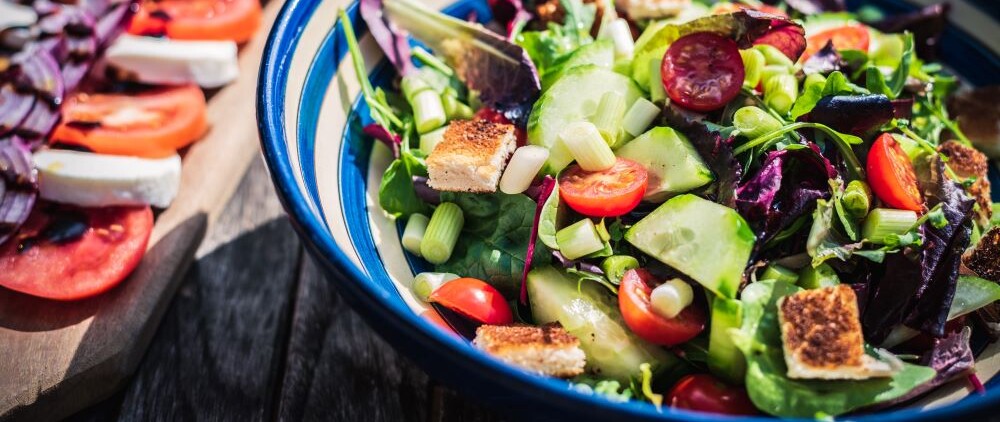Should You Try the Mediterranean Diet for Weight Loss?
EAT BETTER
Should You Try the Mediterranean Diet for Weight Loss?

The Mediterranean diet is known for being an effective way to lose weight, encouraging you to eat flavourful foods that are bursting with health benefits. However, it’s not for everyone, and there are some drawbacks. Let’s take a closer look to help you weigh up whether it’s right for you.
What is the Mediterranean diet?
The Mediterranean diet is based around the style of eating in countries like Italy, Spain and Greece1. It’s based around the traditional foods of the countries, from the 1960s.
Its focus is more around what you eat, rather than calorie counting, or tracking macronutrients, such as with the ketogenic diet.
Some of the key components include:
- Nuts
- Fruits and vegetables
- Seeds
- Legumes
- Whole grains
- Healthy fats
- Poultry
- Seafood
- Eggs
The primary focus is on plant foods, however you can eat lean meats and sources of protein. Of course, people in different countries eat different foods, so the ‘rules’ aren’t too strict.
Why is the Mediterranean diet popular?
Research has found this diet is healthier when compared to that of the United States2, for example. This is because people in Mediterranean countries had lower rates of certain chronic diseases, such as heart attacks, strokes, type 2 diabetes – and this has been attributed to their dietary habits.
Several controlled trials have looked into the benefits of this diet, and suggest it can improve health and prevent heart disease in some individuals. For example, one study of 418 individuals over a 4-year period (the PREDIMED study) concluded that the Mediterranean diet (without calorie restriction) can prevent the development of type 2 diabetes3.
How does the diet help you lose weight?
The diet has a heavy focus on nutritious, whole foods, rather than processed options. Studies show that people who eat a diet rich in whole foods are better able to maintain a healthy weight than those who don’t4. This is because these foods are high in fiber, protein, nutrients and minerals, while helping to suppress hunger, preventing overeating.
As well as this, they’re linked to numerous health benefits, including lowering blood pressure and cholesterol levels.

What are the drawbacks?
The diet can be challenging for some people to follow, as it cuts out many processed foods. These types of foods can be difficult to avoid, particularly if you’re dining out. Also, buying plenty of fresh foods can be expensive, making the diet less accessible for some.
Mediterrean diet for weight loss – meal plan
So, what should form the basis of the diet, and what should you avoid?
- Eat plenty of:
- Fruits and vegetables
- Potatoes, sweet potatoes and yams
- Nuts and seeds
- Legumes
- Whole grains
- Herbs and spices
- Fish and seafood
- Extra virgin olive oil
- Eat some of:
- Dairy (e.g. cheese and yogurt)
- Eggs
- Poultry
- Eat little red meat
- Avoid:
- Highly-processed foods (e.g. processed meats or high-fat, high-sugar options)
- Refined grains like white bread
- Refined oils
- Sugary and fizzy drinks
Much of the advice is the basis of a standard healthy, balanced diet. However, the Mediterranean diet encourages you to stay away from processed ‘diet’ options and anything labelled as such, but stick to whole foods. Water should be your main drink also.
Is the diet right for me?
One of the reasons for the diet’s popularity is its flexibility. It can be followed even if you have dietary restrictions, such as being vegetarian or gluten free5; you’ll just have to pick foods that work. It also encourages creativity and experimentation in the kitchen, which is good news if you’re looking to do more home cooking and meal prepping.
Of course, it’s not for everyone. It’s not a low-fat diet, for example, which some people need to follow for health reasons. Give it some thought to see if it’s right for you.
Top tips
If you’re tempted by the sound of the Mediterranean diet, here are some tips to set you up for success.
Plan ahead
You can make your life easier by planning your meals in advance, and making sure you’re stocked up with the essentials, such as olive oil. This will simplify things by planning before you do your weekly shop, so you know exactly what you’re cooking.
Eat your main meal earlier
Traditionally, in some countries, lunch is the largest meal of the day, eaten between 1-3pm6. This has been linked to weight loss in certain individuals, although it’s not practical for some.

Drink plenty of water
Mediterranean diet or otherwise, hydration is key for weight loss, so make sure you drink plenty of water. Red wine and coffee are also allowed in moderation, but ensure water is your main drink throughout the day.
Exercise portion control
Healthy fats, such as olive oil, are allowed on the plan, but these can be high in calories. The diet doesn’t require you to count these, but you should keep an eye on your portions and exercise control when it comes to how much you consume. Otherwise, you could be consuming more than your body needs, which will derail weight loss efforts.
Make it a lifestyle
This isn’t just a diet, it’s a way of life. So, make sure you’re more active: increase general movement throughout the day, even if it’s just walking. Try to ensure you’re less sedentary – including stretching more often!
Build healthy habits
The Mediterranean diet can improve health and encourage weight loss in some individuals. While it’s not for everyone, and there are other ways to lose weight, it is an option that’s helped many people. Many of the tips can be applied to other diets out there, such as eating plenty of fruit and vegetables and decreasing the amount of processed foods.
There is flexibility within this diet, so if you want to make it your own and tailor it to suit you, you can. Losing weight is a personal journey; you don’t need to adhere to anyone else’s ‘rules’. Essentially, the bottom line is you need to move around more and eat a healthy diet. Focus on building habits to live a healthy lifestyle, not short-term changes.